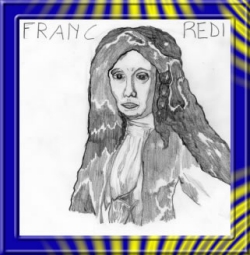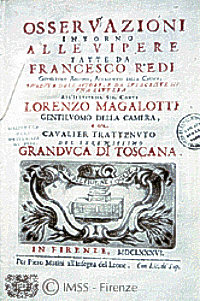|
THE LIFE OF FRANCISCO REDI
|
Francisco
Redi was born in Arezzo
on 18th of February 1627 and died from an apoplectic
stroke
in Pisa in 1697. He was the son of a doctor who worked for
the Grand Duke of Tuscany and had eight sons, four
boys and five girls.
After
he has attended the Jesuitical schools in Florence,
in the
1647 he graduated in Philosophy and Medicine in Pisa. From
1650 to 1654 he lived in Rome, guest of the Cardinal
Column, where he could deepen his competences
in humanistic
and scientific field. Then he went to Florence, by the
court
of the Medici, where he studied the most important European
languages (French, German, English and Spanish).
|

|
|
Redi
was a man of letters and a poet. He was a member of the “
Crusca Academy”, where he collaborated to the
drawing up of the Dictionary, and a member of the Academy of the Arcadia,
where he carried his experience not only as man of letters
but also as naturalist. He always paid attention to the
real facts. Redi was a great scientific investigator
too and all around Europe famous doctor
.
He was also one of the most important members of the Cimento
Academy, that reunited the Galileo Galilei's
disciples for studying the natural
phenomena. He wrote many treatises, among them the most famous
are "The
observations about the viper",
" The experiences about the generation of the bugs",
" The experiences about various natural things, and
particularly the Indian ones" and "The observations
about the living animals who are found in the living animals".
When his father died, he became first doctor of the Grand
Duke of Tuscany.
|
DID
REDI HAVE A SCIENTIFIC MENTALITY OR WAS HE SUPERSTITIOUS?
|
|
One
of the main merits of Redi was that he remained always
faithful to the truth and to the facts, in scientific
field
as well in literary field. He always tried to take away
his job
from the superstitions and the religious principles, that
were often in strong contrast with the scientific search,
as the experience of Galileo Galilei demonstrates. All
his scientific
studies are based on experience, that he carried with his
own risk, as it happened when he drank the viper poison
in order to demonstrate that it would have been mortal
if it had been injected in
the blood,
but it would have been innocuous if it had been drunk.
His
most famous experiment was the demonstration of the falsehood
of the abiogenesis theory.
Redi
used his scientific mentality also in literary field;
for example, in the drawing up of the Dictionary of Crusca,
he not only accepted the
words used from the greatest writers of the 1300's, but
also those
used in the common speech by the learned men of his century.
|

|
|
But in his private life, and especially in the last years of his life,
Redi was as superstitious as all the men
of
his time. When
his
health began to get worse, he tryed magical practices to
cure himself, such as greasing himself with holy oils
or touching ribbons that had been in conctact with the
Saint Ranieri's bones.
|
|

